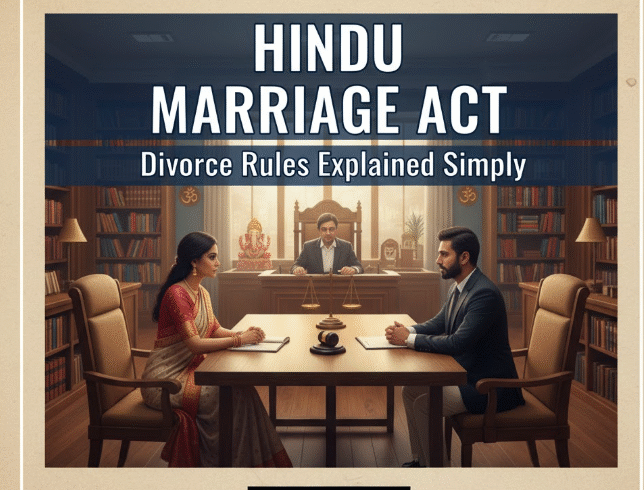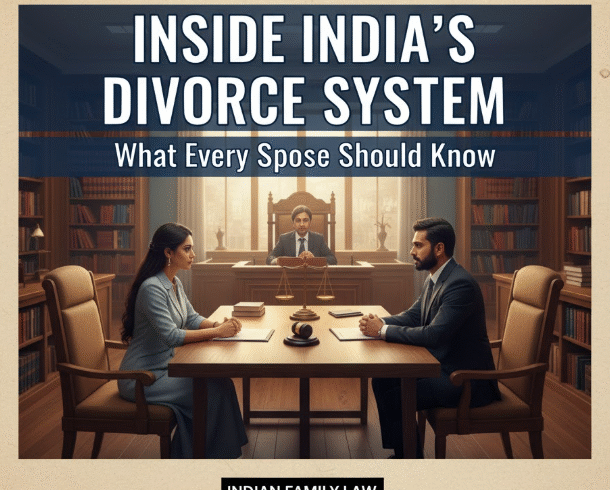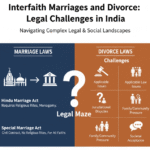10 Important Rights Women Have After Divorce In India
When a marriage breaks up, it creates emotional chaos and confusion about what’s next. For women in India, divorce isn’t simply about ending a relationship — it’s about knowing what your legal rights are and allowing you to rebuild your life with dignity. Many women leave their marriages without taking what is due them because they have no idea of what the law allows.
Indian law acknowledges that divorce can render women vulnerable, particularly if they devoted years to homemaking and raising children. Which is why various laws have been passed to secure women’s interests after separation. Whether you’re thinking of divorce, in the middle of one or looking out for someone who might be, knowing about these rights can make a world of difference.
This article outlines the 10 privileges that every woman has after divorce in India. From money matters to kids and beyond, we’ve written guides in plain English every woman needs.
1. Right to Alimony and Maintenance
Alimony, otherwise known as maintenance, is likely the first thing that you think of if someone mentioned divorce rights to you. This is money your ex-husband may owe to you on a regular basis to help with living expenses.
How Much Can You Get?
There is no ready calculation for alimony in India. Courts look at several factors:
- Your husband’s income and assets
- Your earnings and earning potential
- Your standard of living at the time of marriage
- How long the marriage lasted
- Whether or not you have custody of children
- Your age and health condition
Note: It is the general rule that courts give between a 20%-30% alimony award computed on the husband’s net monthly earnings, just to provide some footing for comparison – but such ratio might not be applicable to everyone since things are evaluated individually in every case.
Types of Maintenance
| When it’s paid | Type | Purpose |
|---|---|---|
| During divorce proceedings | Interim Maintenance | To help pay bills while your case is not yet resolved |
| After the divorce is final | Permanent Alimony | Long-term financial support |
| One-time payment | Lump Sum Alimony | Instead of monthly payments |
As per Section 125 under the Criminal Procedure Code (CrPC), a woman can ask for maintenance even if she is not unable to work but doesn’t have enough income. Hindu females are also entitled to maintenance under Section 24 of Hindu Marriage Act, 1955.
Can Alimony Be Stopped?
Alimony can be stopped or modified when:
- You get remarried (this is an alimony-killer)
- Your financial situation improves significantly
- Situation becomes financially serious for your ex-husband
2. Parental Rights to Custody and Visitation
Children are the victims in a divorce, and Indian law is deeply concerned with their welfare.
Custody Rights Explained
As pointed out before, mothers do not automatically get custody. But when children are under the age of 5, the courts typically prefer to place them with their mother, unless there are significant concerns about her ability to care for the child.
General Rule: The court makes a custody determination based on “the best interest of the child,” not based on the parents’ desires.
Types of Custody
- Physical Custody – Where the child lives
- Legal Custody – Who makes important decisions about schooling, medical care, religion
- Joint Custody – Both parents share responsibilities
- Sole Custody – One parent has full responsibility
What Courts Consider
- Child’s age and preference (especially for children above 9)
- Both parents’ caretaking opportunities
- Emotional ties of the child to each parent
- Stability of home environment
- Any prior history of abuse or neglect
- Child’s educational and social needs
Muslim Women: Under Muslim Personal Law, boys up to the age of 7 and girls until puberty are generally given in mothers’ custody.
Christian Women: Custody is covered under the Guardians and Wards Act, 1890 in which the welfare of a child is paramount.
Even if your ex-husband does end up with full custody of your children, you can still have a meaningful relationship with them.
3. The Right of the Matrimonial Home
Your right to shelter doesn’t suddenly disappear just because the marriage ended. The Protection of Women from Domestic Violence Act, 2005 authorizes residence in shared household to a divorced woman.
What the Law Says
Under Section 19 of the DV Act, you can apply for a “residence order” to be able to:
- Reside in the family home
- Prevent your ex-husband from selling the property
- Access shared household resources
How Long Can You Stay?
This right isn’t permanent. The duration depends on:
- If you have alternative accommodation
- Whether you’re receiving adequate alimony
- Your financial independence
- Custody of children
Courts intend to give you time to find an alternative place, especially if you don’t have a safety net of family.
Important Limitation
This is a right to stay, NOT a right to own. You could live there, but you don’t automatically have a stake in the house unless you helped purchase it or it’s in your name.
4. Entitlement to Share in Property and Assets
Property rights post divorce can be confusing, but here’s what you need to know.
When Are You Entitled to Property?
Streedhan: Anything received in the form of gifts, jewelry and property, before, during or after marriage from your parents, in-laws and relatives is solely yours. Your ex-husband can’t demand any portion of your streedhan.
Owned Together: If something was owned by both, or you contributed to the purchase of it, then you have a share in it. This includes:
- Joint bank accounts
- Real estate purchased and held in joint ownership
- Investments made together
Self-Purchased Property: Anything your husband bought with his earnings doesn’t usually get split in a divorce. You didn’t earn the property, in other words, but you might have some claim on it if you indirectly made contributions to its acquisition and appreciation through homemaking and support of his career.
Property Rights by Religion
| Religion | Type of Property Division |
|---|---|
| Hindu | No automatic right in husband’s property but can claim maintenance |
| Muslim | Entitled to mehr and gifts; no share in husband’s property |
| Christian | Can claim portion of the property if it was jointly acquired |
| Parsi | Property divided based on individual contribution and court discretion |
Proving Your Claim
Keep all documents showing:
- Financial contributions to property purchase
- Joint account statements
- Property registration papers
- Bills for any remodeling or improvements you financed
5. Right to Recover Streedhan
Streedhan may be the purest conceivable right women have — but not enough know how to assert it effectively.
What Exactly Is Streedhan?
Hindu law says the following is streedhan:
- Jewelry before, in and after marriage
- Gifts from parents, relatives, friends
- Money or property given by a spouse’s parents as a gift
- Earnings from your own work
- Property inherited from your parents
Landmark Ruling: The Supreme Court in the 2009 case Anil Kumar Jain vs. Maya Jain made it clear that streedhan was the property of a woman and withholding it amounted to domestic violence.
How to Recover Your Streedhan
- List Them All: Write down everything you can be compensated for
- Lodge a Police Complaint: Under Section 406 IPC (criminal breach of trust)
- File a Case in Family Court: Go to court to petition for loss of streedhan
- File Under DV Act: Invoke Section 19 for residence and recovery orders
If Streedhan Is Lost or Sold
If your ex-husband or in-laws sold your jewelry/property, you can pursue its monetary amount. Courts can require such thieves to pay you the market value for those items.
6. Employment and Career Retention Right
This may not seem like a “right” in the legal sense, but it is very important. You are not restricted from employment or career advancement following a divorce.
Protection Against Job Discrimination
According to Article 15 of the Indian Constitution, it is your fundamental right not to be discriminated on basis of marital status in employment. If you encounter unfair treatment at your workplace as a result of your divorce, you can file a complaint.
Resuming Your Career
Many women slow their careers during a marriage. After divorce you have the right to:
- Return to your profession
- Pursue new education or training
- Start a business
- Assert your professional status and documentation
Name Change Rights
You can choose to:
- Keep your married name
- Revert to your maiden name
- Adopt a completely new name
The choice is entirely yours. You will need to update your official documents through the appropriate legal channels.
7. Right to Defense and Fair Trial
You have the right to an effective attorney by your side in all of your divorce actions.
Free Legal Aid
If you are too poor to hire a lawyer, you have the right to free legal aid under the Legal Services Authorities Act, 1987. There is legal help available free of cost to women in every district at the Legal Service Authority.
What Your Rights Include
- Right to have all legal proceedings conducted in a language with which you are familiar
- Right to full presentation of your case
- Right to cross-examine witnesses
- Right to appeal unfavorable decisions
- Right to apply for temporary relief during proceedings
Protection from Harassment
IPC 498A: You are protected from any cruelty from your husband/in-laws due to Section 498A of the IPC. If you were harassed physically or mentally in marriage, it will be a criminal case even after divorce.
8. Freedom of Movement: Right to Passport and Other Travel Documents
A lot of women find out after they’ve separated that their passport has their husband’s address or is marked with him as an emergency contact. You are entitled to correct these details.
Updating Your Passport
You can:
- Modify it to your home address
- Delete husband’s name from passport
- Get a new passport, if it becomes necessary
No Permission Needed
You do not need your ex-husband’s permission if you want to renew or apply for your passport after the divorce.
If Ex-Husband Holds Your Passport
Lodge a police complaint and go to the Regional Passport Office. The government can give you a new passport and invalidate the old one.
9. Medical and Health Benefits
If you were on your husband’s health plan or employee benefits during marriage, you may wonder about coverage after divorce.
Health Insurance After Divorce
- Employer-Sponsored Health Insurance: Often terminates upon final decree of divorce
- Individual Policies: If you are the policyholder, then your coverage goes on
- CGHS/Government Benefits: Post-divorce, everything ceases for the dependent parties
Your Options
Buy your own health insurance coverage before the divorce becomes official. There are many insurance providers that provide discounted plans for divorced women. If you work, join in your employer’s health plan.
Mental Health Support
Divorce takes an emotional toll. You have the right to:
- Seek professional counseling
- Join support groups
- Take mental health days (under work policies)
10. Right to Social Security and Pension
This is something that will potentially make a financial difference but is usually overlooked.
Pension Rights
If your ex-husband is a government employee or has a pension, you may be entitled to a portion. As per the Employees’ Provident Funds and Miscellaneous Provisions Act, 1952, courts have the power to direct that part of an employee’s pension can also be disbursed as alimony.
Other Benefits
- Life Insurance: If named as a beneficiary, you are entitled unless the policy is altered
- Gratuity: You might be entitled to some even if the marriage lasted long enough
- Provident Fund: PF has been awarded as part of divorce settlement in some cases
Government Schemes
As a divorced woman you can still avail many government welfare schemes:
- Housing schemes for single women
- Self-employment programs
- Scholarships for children of divorced women
- Financial assistance programs
Religious Laws and Divorce Rights
India’s personal laws differ by religion and in turn affect divorce rights differently.
Hindu Women
Regulated through the Hindu Marriage Act, 1955:
- Can seek divorce on charges such as cruelty, adultery, desertion, conversion, insanity
- Eligible for maintenance under Section 24 (pendente lite) and Section 25 (after divorce)
- They don’t have any automatic right to property, but can claim maintenance
Muslim Women
Which law is applicable to Muslims for divorce?
- Right of mehr
- The duty of maintenance for the iddat period (3 months from the divorce)
- Can sue for long-term maintenance based on Supreme Court verdicts
- Right to gifts, ornaments etc.
Christian Women
Governed by the Indian Divorce Act, 1869:
- Can claim permanent alimony
- Entitled to share in property
- Courts take into account personal contributions to marital property
Parsi Women
To be governed by the Parsi Marriage and Divorce Act, 1936:
- Can claim permanent alimony
- Equitable distribution based on the particular circumstances of each party
- Courts focus on equitable distribution
Common Challenges Women Face
Though they have these rights under the law, not all experience a smooth process. Here are common obstacles:
Financial Intimidation
There are some ex-husbands who may hide assets or under-report income to try and lower alimony. If you think there’s been financial funny business, consider a forensic accountant.
Lengthy Court Proceedings
Divorce cases may take years. File for temporary maintenance at once to get something to live on while the case is going on.
Social Stigma
Divorced women are not treated fairly in our society at times. Speak to support groups, and remember that legal rights are not dependent on social attitudes.
Documentation Gaps
Many women lack financial documents. From the moment you start to consider divorce, begin collecting bank statements, property documents and proof of income.
Taking Action: Your Next Steps
If divorce is pending, how can you protect your rights?
- Seek Legal Help Right Away: Don’t procrastinate. If you seek a lawyer earlier, it may save you from an expensive mistake. For expert legal assistance, visit https://zistalegalis.com.
- Document Everything: Copy all financial documents, your marriage certificate, the proof of gifts, property papers and any evidence of being harassed.
- Separate Bank Accounts: Do not put at stake your financial dependence during the case.
- Put Everything on a List: Create a written inventory of joint assets, investments and valuables.
- Secure Your Streedhan: If it is not too late, get back all your jewelry and gifts before filing for divorce.
- Try Mediation: Some divorces don’t have to be adversarial. Mediation is usually quicker and less traumatic.
- Seek Interim Relief: Don’t wait for final orders. File for interim orders of maintenance and custody.
- Find Your Support Networks: Meet other women who’ve divorced. Their experiences can guide you.
Moving Forward with Confidence
Divorce is not the end—it’s a beginning. This can be a stressful process, but when you know your rights you can negotiate from a point of power.
Remember these key points:
- You are entitled to be financially supported with alimony
- Custody rulings serve the best interest of your children
- Your streedhan is your own
- You have the right to live with respect and chase your dreams
- You have the right to be represented by private attorneys or you may ask for free legal help if you cannot afford a lawyer
Indian legislations have changed over the years to attempt to safeguard women’s rights post divorce. Ranging from the progressive verdicts of the Supreme Court to protective legislations as DV Act, the legal system provides its backing to women who wish for a fair treatment.
Don’t be afraid or ill-advised to not claim what’s already rightfully yours. Speak to some lawyers, get your paperwork in order, go through the process a step at a time. No woman should ever leave a divorce feeling like she’s lost her dignity and is uncertain of what lies ahead.
Your rights are not favors but entitlements under the law. Own them, and live the independent life you’ve earned.
For more information on legal rights and services, you can also refer to the National Commission for Women.
Frequently Asked Questions
Q1: Can I ask for maintenance if I’m working and have an income?
Yes, you can take maintenance even if employed. Courts look at whether your income is enough to sustain the standard of living you and your spouse had during marriage. If there is a large disparity between your income and that of your ex-husband — or if what you earn does not cover reasonable expenses — you are eligible for maintenance.
Q2: What is the duration for divorce in India?
The timeline varies significantly. Joint petition divorces can be granted in 6-18 months. Divorces that are contested can take 3-5 years or more, depending on court backlogs and the complexity of the case. If that is the case, filing for temporary maintenance can help you get through this time financially.
Q3: What happens to joint bank accounts in case of divorce?
If possible, joint bank accounts should be closed, or closed off from the respondent as soon as divorce action is initiated. From a joint account, both parties can remove money so be sure to pay attention to the balance and come up with a plan for division. The courts can freeze accounts if there’s a worry about losing assets.
Q4: My ex-husband wants to stop paying alimony if he loses his job.
He can go to the court to change the alimony amount due to changed financial status. But he can’t just stop paying without court approval. The court will check his representations and determine whether to terminate, suspend temporarily or modify the current alimony agreement.
Q5: Am I required to return my in-laws’ gifts post divorce?
No, gifts from your relatives to you during the marriage are streedhan and they will be your exclusive property. Your ex-husband and in-laws do not have the right to ask for their return. But gifts for household use may be treated differently from personal gifts like jewelry.
Q6: Can I change my child’s last name after divorce?
A child’s name can be officially changed only by consent of both parents or by court order. If your ex-husband disagrees, you’d need to file a petition with the court and let it determine what is in the child’s best interests. You having custody doesn’t mean you automatically have the right to change a surname.
Q7: What if my husband doesn’t have a job? Can I still get maintenance?
Yes. Courts consider potential, not just cash actually received. If your husband is educated and can work, but just doesn’t want to, the judge can do something called “impute” his income based upon what he could earn and what, based on his educational background or work experience (including previous or last employment). He should not be able to shirk his maintenance obligations by choosing willingly to be unemployed.
Q8: What right does a daughter have in the property of her mother after divorce?
Yes – children have inheritance from both parents even if they are divorced. If you have property, your children are entitled to it. There is no effect in a divorce on parent-child inheritance rights — only on spousal inheritance rights.
Q9: Can I get a divorce if my spouse is living out of the country?
Yes. You can file for divorce in India if your husband is staying abroad, as long as the marriage in question has either taken place in India or both you and your husband have last resided together in India. The court can go on without your husband, but it may be a longer process.
Q10: What paperwork do I need before getting a divorce?
The documents which can be produced to support one’s case include the following: marriage certificate, valid identity proof, residence proof, income proofs (yours and husband’s), bank statements and passbooks, property documents, investment records, photographs of streedhan items for identification, evidence of cruelty or harassment if any – they can be in the form of witnesses or documentation from criminal proceedings under Section 498A IPC/PWDVA cases, and any prenuptial/postnuptial agreements.





